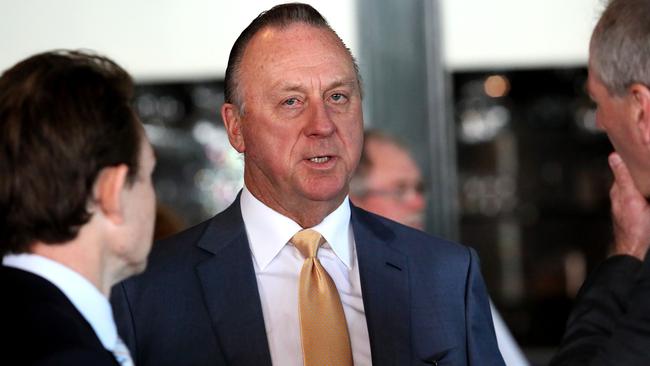
Proxy houses have been calling shareholders in Mineral Resources in recent days to assess whether to recommend that they vote against resolutions at its annual general meeting on November 21.
Proxy firms could recommend a vote against the group’s remuneration report, the re-election of directors Denise McComish and Jacqueline McGill, and the granting of share rights to founder and managing director Chris Ellison.
It comes after the billionaire Ellison admitted he was a tax cheat who failed to make proper disclosures about a series of companies registered in the British Virgin Islands, and apologised for what he called “a serious lapse in judgment”.
He now faces scrutiny over his dealings while chief executive of the $6.7bn listed miner, including deals that could be perceived as featuring a conflict of interest.
Proxy firm Ownership Matters has taken exception to such matters in the past, including contracts awarded to the shipping company of his daughter Kristy-Lee Cracker.
So far, the James McClements-led board has stood behind Ellison over the tax scandal and the company is not making further comment.
Influential shareholders on the register with stakes of 5 per cent or more include AustralianSuper and L1 Capital, while Magellan Financial’s Airlie Funds Management owns close to 5 per cent, and their views will matter a lot in determining whether Mr Ellison stays or goes.
AustralianSuper, the nation’s largest superannuation fund which reduced its holding from 5.1 per cent to 4.89 per cent last week, says it continues to engage with the board as it assesses its longer-term position in the company.
There have been suggestions that the shareholders could put pressure on Mr Ellison to step down after the company’s share price fell 4.6 per cent on Friday, taking its market value to $7bn and its share price to $34.25.
The stock fell about 18 per cent over the week.
Mr Ellison is listed in the annual report as being the largest shareholder with 11.5 per cent.
Circuit Breaker
As the Mineral Resources scandal plays out, WiseTech’s founding boss, billionaire Richard White has been under fire as embarrassing details emerge about his personal life, causing the share price of the logistics software group to tumble.
But news he was taking a break and would return in a new role as a consultant to the company proved to be a circuit breaker for the stock.
It caused the share price to bounce back by more than 12 per cent on Friday, the day after the announcement, in what could provide a useful precedent for proxy firms, directors and shareholders in terms of how to handle cases involving bad behaviour by billionaire founders of listed companies.
Market observers say that in similar instances in the US, Mr White’s counterpart would have stepped down far earlier and Mr Ellison’s equivalent would have already resigned, as concern mounts that directors are not standing up to company-founding chief executives when it comes to misconduct.
Even if pressure is mounting on Mr Ellison to stand down as chief executive, it’s a move most expect the founding billionaire to resist. However, an investigation by the Australian Securities & Investments Commission into his business dealings may intensify that pressure, while directors could also leave the board.
Fresh Start
One theory in the market is that well-regarded mining executive Nev Power, who previously ran Fortescue Metals Group, could be brought on to the Mineral Resources board, while a highly respected executive like the former boss of OZ Minerals, Andrew Cole, who has no close links to Mr Ellison, could be headhunted to become the company’s new chief executive should Mr Ellison step down.
Another possibility is former Newcrest boss Sandeep Biswas.
Sources say such appointments would be received favourably by the market.
The first big play by any incoming boss at Mineral Resources could be to tap the market.
Many consider it line-ball as to whether Mineral Resources needs to replenish its currently stretched balance sheet.
Any move could come immediately or just months into taking the reins of the group.
As earlier reported by DataRoom, there are estimates that a capital raising by MinRes could see it asking for $1.5bn to $2bn.
This would probably be done through its regular Wall Street banking adviser JPMorgan.
A further fall in the value of its shares, a decline in the iron ore price or a breach of lending terms based on adverse findings into Mr Ellison’s conduct could all be catalysts.
At June, its net debt was $4.4bn.
Two of the top four Australian banks are involved a revolving facility of $800m to Mineral Resources, with key covenants.
The majority of the remaining debt is in the private placement market, which does not have covenant arrangements.
The first tranche of that debt is not due until the 2027-28 financial year.
Another possibility in the longer term is that the destabilising circumstances surrounding Mineral Resources could lead to a company break-up.
Mineral Resources is already in the middle of a process to sell off its energy operations – the gas assets it owns in the Perth Basin – as it looks at ways to strengthen its balance sheet to fund developments, including its Onslow iron ore project.
One market observer even went as far as suggesting that the other three units – lithium, iron ore and mining services – could also be broken off and potentially sold over the longer term.
The company generates much of its income from its three iron ore hubs – Onslow Iron in the western Pilbara, Utah Point in Port Hedland and Yilgarn in Esperance, all in Western Australia.




To join the conversation, please log in. Don't have an account? Register
Join the conversation, you are commenting as Logout